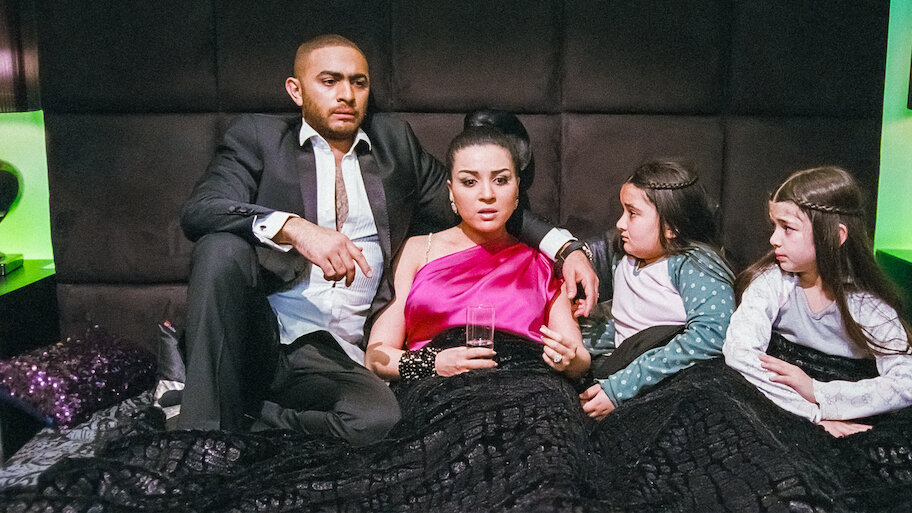Egyptian cinema has long charmed audiences with its “nice guys,” who appear devoted, protective, and romantic. The nice guy does the work to win the girl, wooing her with compliments and displays of affection.
But behind the grand gestures and charming banter lies an insidious truth: that the “nice guy’s” love in Egyptian romantic comedies is often laced with control, jealousy, and fragile masculinity. Nice guys portrayed in cinema are often misogynistic men who exert patriarchal control, disguised as humor for the audience.
In the West, the term “nice guy” has come to carry an ironic, negative connotation. It typically describes men who present themselves as polite, gentle, or non-threatening toward women, yet quietly harbor the expectation of romantic or sexual reward for their behavior. The label has become associated with entitlement, passive-aggressiveness, and a lack of confidence. Being a “nice guy” is not about genuine kindness but a performative politeness that masks deeper resentment and misogyny.
Meanwhile, being a “nice guy” in Egypt’s traditional society often refers to a man who is family-oriented, protective, and morally upstanding. However, some disguise themselves as nice, and their kindness and affection are often thinly veiled attempts at exerting control. Within cultural norms, the man is expected to serve as the patriarch of both the family and the relationship. With a strong emphasis on masculinity and strength in Egyptian society, men frequently assert dominance under the guise of protectiveness and love.
The Egyptian romantic comedy, Taymour and Shafika (2007), starring Mona Zaki as Shafika, and Ahmed El Sakka as Taymour, a seemingly charming “nice guy” for whom the audience rooted when the film debuted in theaters.
The action-packed film made many young girls dream of falling in love with their childhood sweetheart from across the hall, who then saves them from an actual explosion. Yet, viewed through a critical lens, the film’s representation of gender relations, while humorous and cute at times, strikes some viewers as a disguise for control, misogyny, and toxic masculinity as acts of love and “protectiveness.”
Taymour tells Shafika what to wear, who to talk to, and how, assuming authority to grant or withhold her freedom. At first glance, he seems like a jealous Egyptian man who fears for his partner’s safety. However, to the critical viewer, it becomes clear that a patriarchal mindset and hegemonic masculinity drive his controlling behavior.
Hegemonic masculinity, common in the Middle East and rooted in dominance over women, becomes threatened when the woman has her freedom of choice and action. By its standards, wearing a revealing outfit or talking to other men and accepting their compliments would automatically mean that Shafika is not in a relationship with a real man.
Taymour, who eventually ends up marrying Shafika, is one example of a celebrated apparent embodiment of a loving, devoted man who, in reality, oppresses women and seems to even hate them.
Many Egyptian media formats depict “nice guys” who, upon closer inspection, reveal themselves as possessive and egocentric, such as the character of Omar in the film Omar & Salma (2007).
The film, led by Tamer Hosni as Omar, was seen as hilarious and became a hit, leading to two sequels about the couple’s marriage and family life. However, this “nice guy” repeatedly yells at Salma, played by Mai Ezz El Din, humiliates her, lies to her, invalidates her, cheats on her, shames her, and even beats and slaps her.
The film prompts unhealthy relationship dynamics and patriarchal dominance, disguised as sensitive masculinity in comedic and romantic contexts.
Masculinity in the Middle East and North Africa often revolves around competing with other men, and misogyny can come from the fear of seeming less masculine in their eyes, according to the book Men in African Film and Fiction (2011). Similar to Omar, Taymour shows his true, fragile colors when Shafika is appointed as a government minister, and he is assigned as her guard. He fights the idea of working for his partner or the latter outshining him, according to society’s standards.
Another example of a comedy film that portrays such a “nice guy” is Al Hassa Al Sabba (The Seventh Sense, 2005), starring Ahmad El-Fishawi as Yehia. When Yehia gains the power to hear other people’s thoughts, he uses it to become Egypt’s best Kung Fu player and win the love of a girl he likes, Mona, played by Rania Kurdi.
Throughout the film, he notes her likes and dislikes and lies to her, pretending to have more in common with her. While the film is funny and makes the audience root for Yehia, he is building a relationship on lies and crossing unthinkable boundaries. Even though Mona learns that he can hear her thoughts and she tries to cut him off, he apologizes, and she forgives him.
Another nice man who captured the hearts of the audience with his charm and sense of humor is Tarek in Zarf Tarek (Emergency, 2006), played by Ahmed Helmi. In the first half of the film, he deceives his love interest, played by Nour, by posing as a man named Omar. Though she eventually uncovers the lie, after time apart, she forgives him and they reconcile. By the film’s end, the audience is led to believe the end justified the means, when in reality, he had strung her along for months, selling her a lie, and undermining her intelligence.
This repeated narrative normalizes controlling behavior, misogyny, and fragile masculinity under the illusion of “being nice.” It undermines women’s agency and reinforces cultural acceptance of male dominance and gender roles, very similar to the traditional Si El-Sayed archetype from Naguib Mahfouz’s novel, Bayn Al-Qasrayn (Palace Walk, 1956).
Mahfouz wrote the novel as a critique of gender inequality in Egyptian society, portraying Si El-Sayed as a domineering patriarchal figure who demanded authority and respect from women in his family simply because he was the father.
However, the message was not delivered, and this archetype of a man persisted without the irony Mahfouz had imbued it with, influencing future generations and evolving into a celebrated model of masculinity.
The opinions and ideas expressed in this article are the author’s and do not necessarily reflect the views of Egyptian Streets’ editorial team. To submit an opinion article, please email [email protected].







Comments (0)